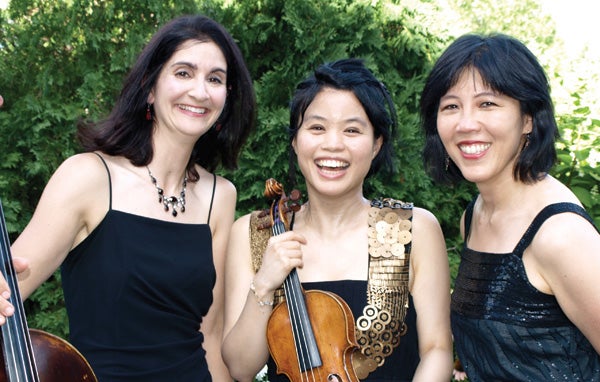|
March 3, 2011
U.S. premiere of Stanford composer Jonathan Berger's Memory Slips set for March 4
"Earworms," "flashbulb memory" and tunes "on the tip of your tongue" composer Jonathan Berger explores how memory affects music. Berger's composition, which was inspired by his dying mother's dementia, highlights the annual "Music and the Brain" symposium.
By Cynthia Haven

Trio Voce will perform Memory Slips on Friday evening in Stanford's Campbell Recital Hall.
As his mother wove in and out of dementia during the last few months of her life, she was haunted by music, Jonathan Berger recalls. The Stanford composer became fascinated with the imprecision of memory, the songs we cannot forget, the tunes that stay on the tip of our tongue.
The result is Memory Slips, which makes its U.S. premiere on campus at 8 p.m. Friday in Campbell Recital Hall, in a concert performed by Trio Voce, a piano trio.
The performance highlights Stanford's annual "Music and the Brain" symposium, which explores the neuroscience of music. The March 4-5 gathering is organized by the Stanford Institute for Creativity and the Arts (SiCa).
Also on the concert program are Shostakovich's Piano Trio No. 1 in C Minor and Beethoven's Piano Trio No. 5 in D Major.
"In a sense, it's a memorial to her," said Berger, a professor of music and co-director of SiCa. "Everything one writes after a parent dies is a memorial in some way."
At 6 p.m. tonight, Trio Voce will give a free performance and discussion as part of the "Informance" series at Mountain View's Community School for Music and Arts.
His mother's death in 2010 caused Berger to reflect on "the profound yet inadvertent role that music played" as his mother experienced "a series of remarkably vivid musical hallucinations."
"She couldn't place the song, she didn't know why she was singing it," Berger said. "She didn't know what it was, where it came from. Yet it turned out to be an autobiographically significant song."
Her death last year launched an intense period of composition for Berger, in time for a premiere in Tel Aviv in April. The piece also has been performed in Toronto and Edmonton, Canada.
The first movement of the piece, "Madeleine," explores how "flashbulb memory," the term psychologists use to explain the way a simple sensory stimulus for Proust, it was famously the French cookie can jar a vivid and detailed storehouse of memory.
The second movement takes on a Gaelic mythic demon, Leannán Sídhe, a somewhat vampiric fairy who seduces artists in exchange for a short but brilliant creative life.
The third movement, "Waltzing on the Tip of My Tongue," explores the musical variant of the familiar frustration we hear the tune but cannot recall its name, or can't recall more than a snippet of a song.
The piece concludes with his mother's hallucinated rendition of the 1940s popular song "Cruising Down the River," in a movement titled "Auris Vermus," Latin for "earworm," the term for that musical frustration when you can't get a tune out of your head.
"I have been especially taken with Jonathan Berger's writing for string instruments and for the array of intimate chamber ensembles that have performed his work," said Jenny Bilfield, artistic director of Stanford Lively Arts and a former composer herself. "To my ear, the harmonic palette he has drawn upon in so many of his works is luscious and expressive."
Music "is really about expressing and communicating emotion," Berger said, noting that Memory Slips has "very sudden and angular changes" and "wavers between abstraction and recognizable, calm melodies."
Berger was last year's Composer in Residence at the Spoleto USA Festival. He has received commissions and awards from the National Endowment for the Arts, the Bourges Festival, Westdeutscher Rundfunk and Chamber Music America. His Miracles and Mud was released by Naxos on their American Masters series in 2008.
The Trio Voce performance performers include Marina Hoover (cello, formerly of the St. Lawrence String Quartet), Jasmine Lin (violin) and Patricia Tao (piano) is presented by Stanford Lively Arts. Tickets range from $28 for adults and $10 for Stanford students to half-price tickets for young people age 18 and under. Discounts are offered for groups and non-Stanford students. Call (650) 725-2787 or visit Lively Arts online at http://livelyarts.stanford.edu.
-30-
|